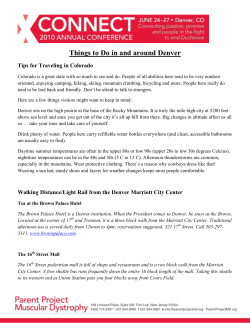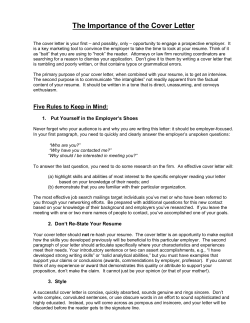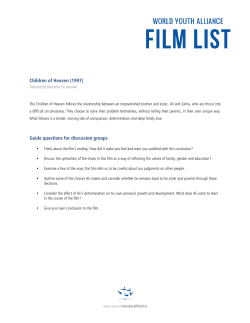
John Denver ” WHAT ONE MAN CAN DO”
”WHAT ONE MAN CAN DO”
A documentary film proposal based on the life and legacy of
John Denver
Celebrating the Power of the Creative Spirit
Proposed by JoLynn Long and Terry Lipman
in association with JD Spirit and WOMCD, LLC
Phone 512 912 8722
Fax – 512 857 0217
Email: terrylipman@jdspirit.com
1
2
PROJECT SUMMARY
What one man can do is dream
What one man can do is love
What one man can do is change the world and make it young again.
Here you see what one man can do.
Everyone knows John Denver as an entertainer. But few know him as a humanitarian - a man of the people, a man
of the earth.
This is the documentary that’s yearning to be told.
John Denver firmly believed that his celebrity was given to him for a purpose. He saw his role on this planet as a
catalyst to bring people together and to create a world of peace and sustainability, and in this, he inspired people to
action. He co-founded The Windstar Foundation and educated millions on the future of our environment. He
fought world hunger, and he strove for world peace. He sang with Soviets and sang for the Chinese. He supported
NASA’s space program at a time when its future was in jeopardy.
This documentary’s content will highlight the extraordinary contribution Denver made – not just by himself, but in
the way he brought others along and talked to them about what they could do. This film is not about John Denver,
but about what it is to be a human being to celebrate the creative spirit; to show what humans can accomplish
given the personal courage, the commitment, and the discipline. This is the legacy he left.
Through a combination of interviews and stories from those who traveled with him, plus the use of archival footage
and still photographs in filing cabinets around the world, audiences will get to experience in their hearts the seeds
John Denver planted and how those seeds have grown and lifted the consciousness of so many lives. Most
urgently, it will highlight the importance of John’s mission, and call us to take it on ourselves; to continue our fight
for world peace, freedom, and the sustainability of our future generations. We’ll discover where we might fit into the
jigsaw puzzle of human experience and be inspired to make our own positive difference.
All of us are faced with increasingly difficult choices within what seems a chaotic world. Global climate changes,
the war on terror, corruption, pollution, looming fossil fuel shortages, hunger, and AIDS are all seemingly intractable
issues that tempt us to surrender, become apathetic or act in dysfunctional ways.
This documentary will inspire people. It will show them that they can make a difference. It will show them, through
the life of an ordinary man with nothing but a dream and a commitment to succeed, What One Man Can Do.
3
SCRIPT TREATMENT (UNDER DEVELOPMENT)
The movie traces John Denver’s personal journey – not to pay tribute to a pop star, but to see a man struggling with
himself, his image, his relationships, and his heartfelt desire to make a difference. It is important that we see
ourselves in John. If he remains someone who is larger than life – a pop star AND a humanitarian – then we, the
audience, might walk away feeling like it's not about us; it's about people who have gifts, people who are “special”
in a way we’re not. The message of the film is that it is about you, me, and the desire we all feel to make a
difference.
We start by tracing his childhood. Through interviews with family members and friends, as well as 8 mm home
movies from his childhood, we see how Henry John Deutschendorf, Jr., the son of an Air Force officer and flight
instructor, faced challenges growing up, moving all around the country, so no place felt like home. How he started
playing his grandmother’s guitar at the age of 12 and started writing songs of love and longing: an in-the-world
longing for love, for Annie; and also for something higher, as expressed in his songs influenced by nature.
As we interview people along that path – those he worked with, those who inspired him – we begin to see how John
came to be the man he was; where his beliefs came from; how he wrote and sang his songs. Since the audience is
following the same arc that John did, we will inevitably come to the same conclusions and commitments; for
example, that “it’s about time”, which comes from a place of wisdom and knowing, a place of deep humility, love,
and compassion.
As we join John in adulthood, we’ll be able to bring in the wealth of stock
footage available to illustrate the peak of his career, and with that, the
platform he stood on to pursue his vision for humanity:
Fostering World Peace and Global Understanding – John Denver’s
1986 album One World, dedicated to the cause of peace, included the
song “Let Us Begin (What Are We Making Weapons For?)”, which he
recorded with the USSR’s most popular recording artist, Alexander
Gradsky. This was the first time a Soviet and Western artist sang
together, and the two went on to perform on stage together in Russia,
America, and all over the world. John went on to be the first Western
artist to perform in Communist China
and Vietnam.
Environmental Conservation – John’s flagship interest was with the Windstar
Foundation, which he co-founded to educate people on environmental issues
and to inspire them to make responsible choices toward a peaceful and
environmentally sustainable future. By working toward this goal, the annual
Choices for the Future symposium became one of The Windstar Foundation’s
core activities. John continued to support all kinds of environmental causes, the
development of a documentary to
convince Congress to create the Arctic
National Wildlife Refuge.
Ending of world hunger – Jimmy Carter appointed John Denver to his
President’s Commission on World Hunger, from which John personally cofounded The Hunger Project, which teaches those facing starvation to
manage their own agricultural needs. The Hunger Project has flourished for
over 30 years, and is currently working in thousands of communities in 13
countries in Africa, Asia, and Latin America. In the 1980s he went to Africa
and India to witness the problem firsthand, ultimately testifying before
Congress in support of funding for these world causes. In 1985, President
Ronald Reagan conferred on John Denver the Presidential World Without
Hunger Award for his “vision, initiative, and leadership in the effort to achieve
a world without hunger” and for his years of dedication and commitment to
this worldwide cause.
4
Advocacy for the Space Program – John had a natural love for flying. In 1980 he hosted
an award-winning TV special entitled “The Higher We Fly: The History of Flight, which
included a guided tour through NASA’s Space Shuttle Simulator. He worked diligently to
help create the “Citizens in Space” program, for which he received NASA’s Public Service
Medal, usually reserved for spaceflight engineers and designers, and was a finalist to
become the first citizen to fly into space. Ultimately, teacher Christa McAuliffe earned that
pyrrhic honor, as the Challenger exploded with her on board. John dedicated his song
“Flying for Me” to her and all of the astronauts, and testified before Congress in favor of
continuing the space program at a time when NASA’s future was being debated.
These are just a few of the contributions John made throughout his life, just a few of the
changes he catalyzed, and just a few of the issues that will make it into the film. The
audience will discover that what started out as an exploration of a young man’s rise to fame is actually much more
than that – it’s about the will to make a difference and how we, as members of humanity, have a say about that.
By the end of the film, we will find ourselves in 2007 in exactly the place that John was singing and writing about. In
a way, we will hear John's voice for the first time and understand that he was singing our song, and we’ll hear his
music and his words in a new way. We’ll realize he did make the difference he longed to make. Not only in big
ways – through Windstar, through his role as a leader of the environmental movement, through inspiring others to
use their music and popularity to make political statements and affect change – but by inspiring people like you and
me to make that difference, too. And we’ll see that maybe, if we all dream our dreams out loud as he did, we can
make that difference, too.
It's about time we start to see it,
the earth is our only home.
It's about time we start to face it,
we can't make it here all alone.
It's about time we start to listen
to the voices in the wind,
It's about time and it's about
changes and it's about time.
I had a son and my son was a soldier
He was so like my father, he was so
much like me
To be a good comrade was the best that
he dreamed he could be
He gave up his future to revolution
His life to a battle that just can’t be won
For this is not living, to live at the point
of a gun
What one man can do
is dream
What one man can do
is love
What one man can do is
change the world and
make it young again.
Here you see what one
man can do.
5
6
THE MUSIC OF JOHN DENVER
At the age of 12, Henry John Deutschendorf, Jr.’s grandmother gave him a guitar to help overcome his shyness, a
tool that did its job and served him well in making friends for the rest of his life. He moved to Los Angeles in 1964
to try his success as a singer and songwriter, changing his name to the more marquee-friendly “John Denver” and
performing with the Chad Mitchell Trio for several years. In 1969, the group disbanded and his solo career started,
writing the song “Leaving on a Jet Plane,” which rose to number one with the popular group Peter, Paul, and Mary,
and ultimately performing in his own spotlight.
Since 1972, John Denver has sold more than 60 million albums around the world. His 1973 "Greatest Hits"
package racked up sales of over 10 million — an unprecedented achievement for a compilation disc. In the U.S.
alone, John Denver had 10 No. 1 hits and multiple RIAA certification awards: 21 Gold album awards, 14 Platinum
album awards and seven multi-Platinum album awards. As an actor, he starred in the movie hit "Oh, God!" with
George Burns. He hosted several musical variety specials, including the Emmy Award-winning "An Evening with
John Denver." He performed with artists ranging from Frank Sinatra to the Muppets and recorded duets with
Emmylou Harris ("Wild Montana Skies") and Placido Domingo ("Perhaps Love").
John had a love-hate relationship with the media, and as such was often unable to bring attention to the songs that
spoke to him the most: songs like “African Sunrise,” and “I Want to Live,” about the rampant starvation around the
world; pleas for peace like “Falling Leaves” and “Let Us Begin (What Are We Making Weapons For?)”; “The Wings
That Fly Us Home” and “The Gift You Are,” about the human spirit; “Looking for Space,” “It’s A Possibility,” “Sweet
Surrender” on human potential; and of course, on making a difference, “It’s About Time” and “What One Man Can
Do.”
These songs show how large a heart John Denver had. Though his huge hits like “Take Me Home, Country
Roads,” “Sunshine on My Shoulders,” and “Rocky Mountain High” will certainly make their way into the film, we owe
it to John to give a voice to the ones that called to him so strongly, but which the critics never seemed to want to
know.
Many of us who listened to John Denver as 20 yr-olds had a 20-year-old experience of the music.
It touched us deeply, but we didn’t quite know why. Many of us listened to his music in private.
It was a hidden pleasure because it was not "cool" and we wanted to be "cool". It was hard to
square the longings we felt when we listened to his music with our intellectual, striving-to-besophisticated, striving to be our in-the-world successful selves. Now we discover that the reason
the music resonated is that it came from another, deeper place: a place that we were being
pulled toward all along.
-- Kim Agnew
John Denver died in 1997 when a plane he was piloting crashed just off the coast of California at Pacific Grove. He
was cremated alongside his 1910 Gibson guitar, which his grandmother gave him when he was 12 to help
overcome his shyness.
What a gift his grandmother gave him. What a gift she gave the world.
7
PARTICIPANT BIOS
Nathaniel Kahn (Director) – The two-time Oscar-nominated director/producer of My Architect (2003) and Two
Hands (2007). Starting his career in theater, he moved into film in the early 1990s with a short film, "The
Room", which was screened at Sundance and won an award at Cannes. He then collaborated with Miranda
Productions on a number of environmentally themed documentaries, including My Father's Garden (which was
featured at Sundance and broadcast by the Sundance Channel), and Wilderness: The Last Stand (which was
broadcast by PBS and nominated for a regional Emmy Award).
In 2003, after years of dedication, he was able to make and release My Architect: A Son's Journey about
his journey to understand his father, a world-famous architect who had died 30 years earlier. For his
outstanding tale of exploration, My Architect earned Nathaniel Kahn a number of acclamations, including an
Academy Award nomination, an IFP Independent Spirit Award nomination, a Director's Guild of America DGA
Award, and the audience awards at no less than 4 major film festivals.
Kahn followed up his success with last year’s Two Hands: The Leon Fleisher Story, which earned him a
second Academy Award nomination. We are honored to have such an amazing filmmaker as the driving
creative talent behind our team.
Susan Rose Behr (Producer) – Also a two-time Academy Award nominee, Susan Behr is the wind beneath
Kahn's wings as the producer of My Architect and Two Hands. Having served as a researcher and coordinator
with an expertise in historical locations, documents, and information, she brings an essential talent to the team.
Behr is the queen of acquiring archival footage, a skill that will serve us well in a documentary about an
entertainer ten years passed.
Terry Lipman (Executive Producer, Project Developer) – Terry spent 25 years as the CEO of a Sydney-based
international insurance and financial services company and helped film companies take advantage of tax
breaks introduced by the Australian government in the 1980s. Until his retirement in 1989, his organization
participated in over 200 film and TV productions, including the smash hit Crocodile Dundee.
For these and other services to niche Australian industries, Lipman was awarded The Australian Small
Business Award for Entrepreneurial Services to the Community in 1982 and was nominated in 1983 for The
BHP Award of Excellence, Australia’s most prestigious annual small business award.
Lipman met John Denver in Australia and then co-founded the Windstar Foundation Australia, which
produced Higher Ground in Sydney. Lipman continued to co-produce events for Denver, first in Australia, and
then in Aspen. In October of 1997 the two met and discussed the making of a documentary about the effect
one man can have on the world – using the entertainer's legacy and commitment toward making a difference
as a positive example.
John Denver died a week later. For a time, Terry worked on other professional endeavors, but is now
returning to the commitment his friend left behind to show the world what one man can do.
John Raatz (Marketing) – Founder and CEO of The Visioneering Group, Raatz was credited with the success of
What the #$*! Do We Know!?, which "doggedly hung on at theaters while better films – with bigger budgets and
marketing efforts – faded away." (Washington Post, March 20, 2005) The Visioneering Group is a multi-faceted
public relations firm, which focuses on linking together cutting-edge businesses to ensure the success of an
extraordinary product. As a skilled an experienced communicator, strategist, and entrepreneur, Raatz will drive
our PR machine to ensure that once the film has been made, it will enjoy lasting success.
Jessica Cohen (Line Producer, Production Manager) – An A-rated line producer, Jessica most recently enjoyed
success as the line producer on one of the most challenging documentaries ever made, Martin Scorsese’s
recent No Direction Home: Bob Dylan, which won an Emmy, a Grammy, and 4 other major awards, as well as 3
additional Emmy nominations and a BAFTA TV Award nomination.
Craig Hella Johnson (Music) – To enhance the impact of John’s music, we’ve recruited one of the most respected
choral/orchestral conductors in the nation. Having studied at Julliard, Yale, and the International Bach Academy
in Stuttgart, he has served as the artistic director for number of organizations, including his current choral
group, Conspirare, which was nominated for a Grammy Award this year.
8
PARTICIPATION AND SUPPORT
The following individuals, who were associated with John Denver at some point in his life, have expressed their
support and/or agreed to be interviewed for this film:
Dr. Noel Brown – As UNEP’s Director, Noel was a frequent speaker at the annual “Choices For The Future”
Symposia, contributed to John’s involvement as a mediator at the Earth Summit in Brazil and in the creation of The
Aspen Global Change Institute.
Cheryl Charles – Directed the Windstar Foundation and published, with her husband Bob Samples, the
international Windstar Journal.
Tom Crum - Co-founder of the Windstar Foundation, Tom traveled with John for many years as his security man.
Tom is a major leader in the field of conflict resolution using Aikido as a metaphor for life.
Dr. Betty Sue Flowers - Author, poet, internationally renowned business consultant, and currently the Director of
the LBJ Presidential Library and Museum, spoke at the 6th Annual Windstar Foundation “Choices for the Future”
symposium in 1991. Director for KLRU, the Austin affiliate of the PBS Network.
Bruce Gordon – Close friend, promoted the use of small planes to educate people about the environment
John Katzenberger - Director of the Aspen Global Change Institute.
Dr. Phil Lane Jr. – The first indigenous person to win the Windstar Award, Dr. Lane has worked with Indigenous
peoples in North, Central and South America, Micronesia, Thailand, India, Hawaii and Africa.
Martin. N. Leaf - John Denver's lawyer, also served as a member of Trailblazers, the Windstar Board of Directors,
Buckminster Fuller Board of Directors and many other Boards, including the est Foundation.
Donna Lipman – Terry’s wife, co-founded Windstar New York, sang with John Denver in Aspen, and worked with
him on the “Choices for Future” Symposia.
Malcolm McDonald - John’s personal assistant.
Dr. Jordan Paul - Psychotherapist, college professor, author, business consultant and motivational speaker, coproduced “Choices for the Future”.
Pam Peterson – Western Regional Director of the Challenger Center, worked with John when he served on
NASA’s Board of Advisors.
Rev. Dr. David Randall – President and Executive Director of the WHALE Center (Wellness, Health and Lifestyle
Education), served as program development coordinator for the Windstar Foundation, helped lead a team of 150
persons at the Earth Summit in Rio de Janeiro, and was John’s political lobbyist, helping him a number of
appearances at Senate and other hearings in Washington on environmental and space issues.
Rusty Schweikert – Astronaut and close friend of John’s.
Rolland Smith - Author, poet and CBS morning show anchor, hosted John Denver’s annual “Choices For The
Future Symposia” in Aspen Colorado and became a close confidante and a Director of Windstar.
John St. Augustine – An award-winning radio talk show host, wrote about John Denver in his book, "Living An
Uncommon Life - Essential Lessons from 21 Extraordinary People".
Hal Thau – John Denver’s business partner and manager and one of the original directors of the Windstar
Foundation.
Steve Weisberg – Former lead guitarist for John Denver.
Robert White – Leader in professional development and human potential success training, continually donated
executive training to the Windstar Foundation Board and staff, ultimately serving on its Board of Directors.
Bud Wilson – An original producer of the “Choices For The Future Symposium.
Thomas T. K. Zung - Architect, and president of the Buckminster Fuller Institute.
9
10
© Copyright 2025
















